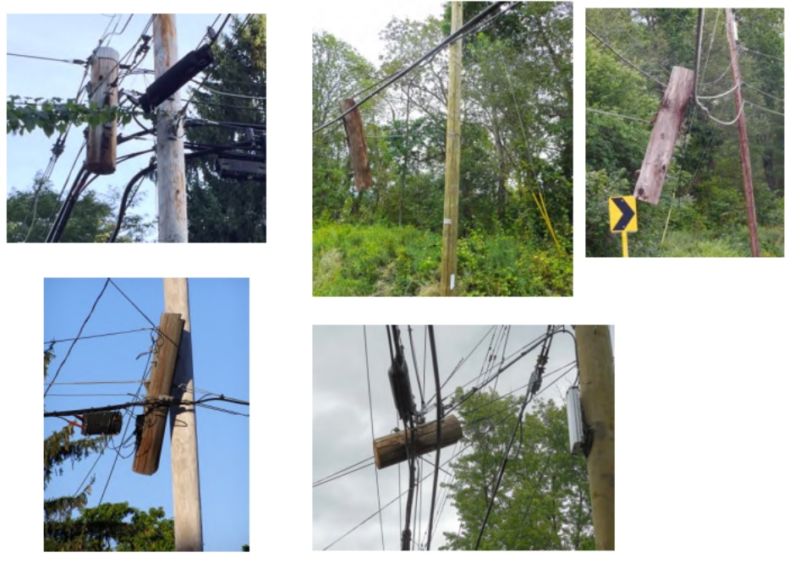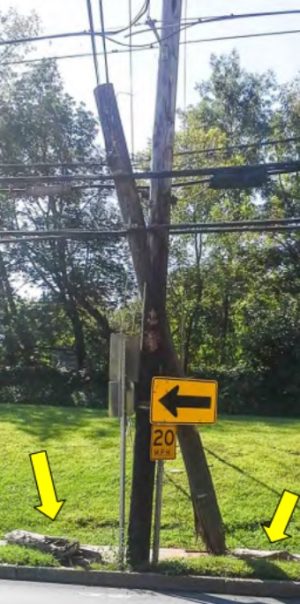
Verizon and a union representing its workers have reached a settlement requiring the company to fix thousands of problems in areas of Pennsylvania where it hasn't upgraded its copper network to fiber.
The settlement of the union's complaint "will require the company to repair and replace bad cable, defective equipment, faulty back-up batteries, and to take down 15,000 double telephone poles," the Communications Workers of America (CWA) said Friday.
Double poles occur when "Verizon has failed to move its equipment from an old pole that was replaced with a new one by another utility (e.g., the electric company)," the CWA said. "In many cases, these are dangerous conditions—poles are falling, leaning, rotting, partially cut off, etc." 
How many double poles are in the state is not clear. The settlement requires Verizon to fix "at least" 15,000 within three years. There are also "dangling pieces of old poles" resulting from Verizon doing "everything it can to avoid the expense of moving its facilities to a new pole," as shown in the pictures above and detailed in the union's complaint against Verizon.
"When VZPA does nothing, and the electric utility must remove the pole from the base, it may leave the portion of the old pole containing VZPA facilities just dangling over the right of way, tied to the new pole by a single cable or a make-shift wooden support," the union complaint said.
The settlement involves Verizon, the CWA, and state officials that represent consumers and small businesses.
The CWA filed its complaint against Verizon in October 2015, and the Pennsylvania Public Utility Commission (PUC) subsequently examined the dispute. The settlement (full text) was filed Friday and is enforceable by the PUC, which would step in if Verizon refuses to carry out its new obligations.
"Today's settlement shows that Verizon cannot neglect its copper infrastructure and provide unsafe, inadequate service to its customers in order to maximize profits,” CWA Local 13000 President Jim Gardler said. The union alleged that "Verizon's inadequate maintenance of copper facilities and service problems... also endangered public and worker safety."
In the case of double poles, the CWA's complaint said that Verizon managers "claim that there is little money in the budget to move facilities to the new poles."
When we contacted Verizon today and asked why the problems described in the settlement weren't previously fixed, the company declined to comment. The settlement does not contain any admission of wrongdoing or liability. In February 2016, Verizon told Ars that the union's complaint was just a "fishing expedition in search of headlines and publicity to be exploited in labor contract discussions."
Friday's settlement is the second time Verizon reached an agreement to fix extensive copper network problems since last month. "Verizon reached a similar deal in May with 17 South Jersey towns that complained of rundown copper lines leading to phone outages and buzzing on the line," the Philadelphia Inquirer reported yesterday. "Verizon said it would respond more quickly in South Jersey to reports of phone outages—within 48 hours—and expand FiOS to four small municipalities, but not the whole 17-town area."
But Verizon "rejected calls from the union to expand FiOS into Pennsylvania areas without it," the newspaper report said.
2.1 million homes still on old copper networks
In 1993, Verizon predecessor Bell signed an agreement with state regulators promising to bring fiber Internet or "comparable technology" to its entire service area in Pennsylvania. In exchange, the state freed the company from the restrictions of rate-of-return regulation. But 2.1 million homes in the Verizon service area still have nothing but slower DSL or wireless service, we reported in a story in June 2015.
For customers stuck on aging copper networks, the new agreement will at least take care of some of the most pressing problems. Verizon is required to share information with the union and state officials during the process.
Here's a list of actions Verizon committed to taking:
- Verizon will conduct engineering reviews of pending cable replacement requests that identified faulty cables, and it will complete all necessary replacements within 18 months. Determinations of which requests will be completed "will be made based on objective criteria such as the number of customers served, the number or percentage of trouble reports tied to the cable within the past year and any other relevant factors," the settlement says.
- Verizon, the union, and state officials will select 30 areas that have particularly high rates of trouble reports, and Verizon will provide additional maintenance and rehabilitation in those parts of the state. "Verizon PA will undertake steps to remediate the identified field conditions, including repairing or replacing cable as warranted in the 30 focus wire centers," the settlement says. Verizon will fix problems the first 15 areas within 18 months and the rest within 36 months.
- Verizon will "perform the facility transfer and/or pole removal" for at least 15,000 double poles within 36 months, with a target of 5,000 per year.
- Verizon will prevent phone outages by replacing remote terminal batteries. The company will review every remote terminal in the service area to determine which batteries need to be replaced, with priority given to remote terminals that serve 911 call centers or police departments. "Verizon has neglected routine testing and replacement of batteries in remote terminals," the CWA said. "During a power outage, when a battery in a remote terminal in a neighborhood goes out, telephone service fails."
- Verizon will report repair and call answer times to the union and state officials every quarter while the agreement is in effect. Verizon will also provide quarterly progress reports to the union and state officials, and it will meet with them twice a year to review progress on completing the settlement requirements.
reader comments
135